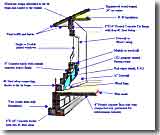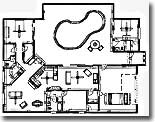We Encourage Our Clients To Build CBS Homes For The Following Reasons:
1) Resale value:
Not a single client has ever asked to be shown wood homes nor have we ever had a client build a wood frame home. Real estate is an investment that hopefully appreciates in value, a wood frame home is much less likely to appreciate.
2) Windstorm:
While wood has it's benefits in high winds, it's flexible while concrete isn't. The most inherent danger to people and property during the high winds of tornadoes and hurricanes is the debris carried in the high winds. Flying at such intense velocity, wreckage can cut right through a building wall and endanger the people inside. According to the Portland Cement Association, tests conducted by Texas Tech University's Wind Engineering Research Center offer dramatic proof that concrete walls withstand flying debris from tornadoes and hurricanes and outperform their wood and steel counterparts.
3) Resource Conservation:
Forty one trees are used for every average wood frame home - 23 for the floors and walls, 13 for the roof, and five for the interior. Concrete is manufactured locally from abundant natural resources. It is inert and non-toxic. Concrete contains recycled materials and is, itself, recyclable.
4) Durability:
Concrete homes are much more durable, far more demands are made on concrete than most any
other construction material. Bridges, skyscrapers, and dams are frequently constructed
with concrete. In addition the walls do not rot, or are as susceptible to damage from
insects, termites and rodents.
5) Fire Protection:
Insurance companies recognize concrete as being safer than any other form of construction when fire threatens a home. Insurance for concrete homes is often 15% to 25% lower.
6) Noise Reduction:
Besides being stronger and more durable, the mass of a concrete wall provides an added benefit - a reduction in noise entering the home. Although some sound will penetrate the windows, a concrete home is often two thirds quieter than a wood frame home.
7) Safe Rooms:
Safe rooms are becoming a more popular option in South Florida. The best way to keep your family safe during a tornado or hurricane is to build a concrete safe room inside your home. A safe room is a small, windowless room that is completely encapsulated in concrete - walls, ceiling and floor. Typically, the room would be located in a central area of the home for additional protection as well as accessibility, but can be placed on the outside wall of the home. A safe room can be incorporated into the construction of a new home, or can be retrofitted into an existing home. In addition the safe room can function year round as a usable area, such as a bathroom, closet or utility room. You'll never see a safe room built of wood.
8) Curb Appeal:
A concrete home is well suited to Florida's tropical climate, the vast majority of wood homes simply look out of place in most of South Florida. Additionally, some interesting effects, such as curved walls and frequent corners, can be less expensive to build into a concrete home.
9) Reduced Energy Bills:
Concrete homes save energy in two ways. The mass of the concrete slows down the passage of heat or cold moving through the wall. With the same insulation, a concrete home stays warmer in the winter and cooler in the summer. Also, concrete walls are more air-tight than wood frame walls. Since leaks account for a large percentage of energy loss in the home, concrete homes enjoy savings in energy consumption.
Why Build a New Home _________________Step to Building a Home










